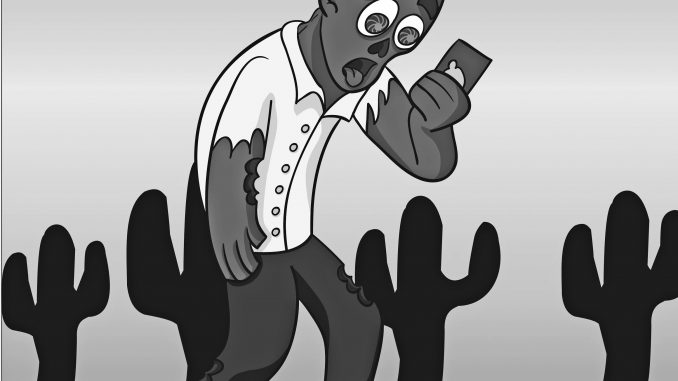
By Alexis Steagall, News Editor
 In the U.S., the average teen spends roughly nine hours on their mobile device each day. This means that teenagers spend about one-third of their day locked onto a screen.
In the U.S., the average teen spends roughly nine hours on their mobile device each day. This means that teenagers spend about one-third of their day locked onto a screen.
Many people don’t take notice of mental health risks attached to prolonged phone use. Recent studies claim the release of new technology such as the smartphone may be linked to a sudden rise in mental illness among the teenage population.
Along with the use of phones in general, social media has also been linked to low self esteem and self doubt. Roughly 95 percent of Americans own a cellular device of some sort, according to the Pew Research Center. As a result, many teens have access to apps such as Snapchat, Instagram, and Twitter, all of which can be used to express thoughts and creativity. But sometimes, sharing these ideas can have negative outcomes.
“I lost motivation to create interesting photos on my Instagram page. It got so stressful that I deleted the account many times. The number of likes and followers has personally affected my mental health, I’m always stressing about who’s going to see it or who’s going to like my posts,” said Justin Flores, a former student of Indian Trail High School & Academy.
Although phones were originally created for communication purposes, they appear to limit face-to-face interaction. This can cause many problems such as social isolation and overall lack of communication. Many people find themselves clinging to their phone in awkward social interactions, as well as mindlessly scrolling through Instagram while waiting in line.
“The last time I went on a date she was on her phone most of the evening, and she had a hard time talking with confidence. It was like going on a date with a brick wall,” said Ryan Smith, a General Studies senior at IT.
On the positive side, the internet is an excellent resource for students to access learning material and research, keep in contact with friends and family, and express themselves. Like everything else in the world, it has its pros and cons.
Studies linking phone usage to a decline in mental health claim that a person who spends more than five
hours on their phone each day is more likely to have suicidal thoughts. Other common signs of mental health issues include insomnia, loss of concentration, fatigue, change in appetite, mood swings and sadness.
There are many factors contributing to depression, therefore it is highly unlikely a person will be diagnosed solely because of the amount of time they spend on the phone. Genetics, traumatic events, and natural chemical imbalances are all risk factors.
Health professionals stress how important it is to address mental illnesses as someone begins to show signs in order to receive the best possible help. Some say that taking time away from the phone screen may help cast aside the dark shadow of negativity.
“Just look up from your phone and talk to someone. I’m scared our kids are not going to have any social skills due to technology. We need to develop social skills to teach our kids. I just hope I’m not the only one in the school who thinks this,” said Smith.
*If you or someone you know expresses any intention of self harm or suicidal thoughts/tendencies, please contact the U.S. suicide hotline at 1-800-273-8255 for help.
